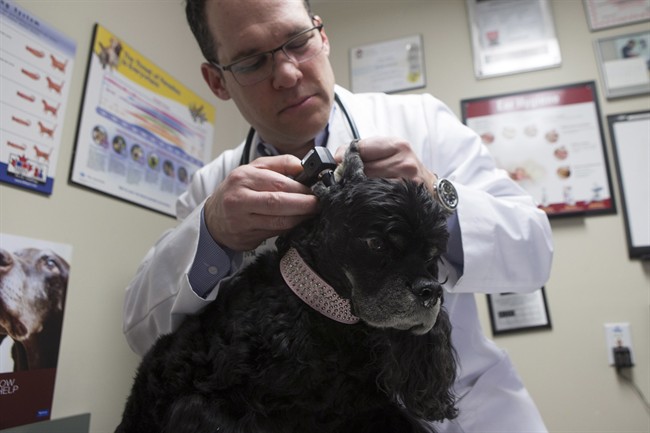TORONTO – With spring in full swing, a small animal vet says it’s important to ensure dogs and cats are in good health with the arrival of warmer weather.

Canadian Veterinary Medical Association member Dr. Ian Sandler, who practises at Toronto’s Rosedale Animal Hospital, shares key pet care suggestions for the new season:
1. Monitor weight changes
It’s not uncommon for adults to see a spike in their weight when the temperatures nosedive – and pets are no different. Dogs often aren’t walked with the same frequency during the winter, which may lead them to pack on a few extra pounds.
Sandler said owners should be monitoring their pets’ activity level and food intake.
“Even if we can just go on a couple of extra walks a day, it will slowly start to have a huge impact on their lifestyle,” he said.
“Obviously with cats that may or may not be going outdoors, it may be a little more difficult. But oftentimes, just using cat trainers or other toys like laser pointers to help cats move around the house a little bit really, really helps.”

Get weekly health news
Sandler said healthy snack options like apples or carrots for dogs, or low-calorie treats for cats, also work well.
2. Watch for seasonal allergies and sensitive skin
Unsure if your pooch has seasonal allergies? Be on the lookout for dogs who start to scratch as a result of very itchy skin.
“They may be more prone to skin infections, to skin irritations, so they may require antihistamines, sometimes anti-inflammatories, special shampoos.”
While salt and sand may no longer be on the streets or sidewalks, Sandler said pet paws may still be quite dry. Salves can be used a couple of times a week to moisturize pads and prevent cracking. However, for extra dry and cracked paws, daily applications may be needed.
If coats have grown in considerably during winter, brushing or shaving will help aerate the hair and skin, Sandler said.
3. Be mindful of animals outdoors
Owners should be mindful of pooches ingesting old leaves and sticks which had been buried under snow.
“When dogs eat a lot of this decaying plant matter if they’re digging in the backyard, it can actually cause quite a significant upset stomach or gastroenteritis,” said Sandler.
“Certainly in the city, you want to be a little bit careful with the ravine systems this time of the year, both in terms of the fast-running waters but also in terms of what’s actually becoming exposed and what dogs will eat.”
For heartworm disease – a parasite passed from dog to dog by mosquito bites – treatments can include a chewable tablet or topical ointment.
“These drugs are very, very safe and very helpful at preventing the transference of this disease from one dog to the other.”
Sandler said flea control for both cats and dogs should also be top of mind for owners, as fleas can jump from one animal to another and potentially result in an infestation.
Many of the topical and oral products available can help prevent heartworm, fleas and ticks and some will also have coverage for intestinal parasites.
“The good news is between one and two products a year can cover your pet for multiple diseases.”





Comments